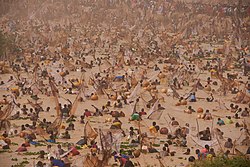
Back Kebi ANN ولاية كبي Arabic Kebbi ştatı Azerbaijani کبی ایالتی AZB Кебби Bulgarian Kebbi State Bislama Estat de Kebbi Catalan Kebbi State CEB Kebbi Danish Kebbi German
Kebbi | |
|---|---|
 Image showing the yearly Argungu Fishing Festival held in Argungu | |
| Nicknames: | |
 Location of Kebbi State in Nigeria | |
| Coordinates: 11°30′N 4°00′E / 11.500°N 4.000°E | |
| Country | |
| Date created | 27 August 1991 |
| Capital | Birnin Kebbi |
| Government | |
| • Body | Government of Kebbi State |
| • Governor (List) | Nasir Idris (APC) |
| • Deputy Governor | Abubakar Umar Argungu (APC) |
| • Legislature | Kebbi State House of Assembly |
| • Senators | C: Adamu Aliero (PDP) N: Yahaya Abdullahi (PDP) S: Garba Musa Maidoki (PDP) |
| • Representatives | List |
| Area | |
| • Total | 36,800 km2 (14,200 sq mi) |
| • Rank | 10th of 36 |
| Population (2006 census) | |
| • Total | 3,256,541[1] |
| • Estimate (2022) | 5,563,900[2] |
| • Rank | 22nd of 36 |
| Demonym | Kebbian |
| GDP (PPP) | |
| • Year | 2023 |
| • Total | $16.6 billion[3] |
| • Per capita | $2,900[3] |
| Time zone | UTC+01 (WAT) |
| postal code | 860001 |
| ISO 3166 code | NG-KE |
| HDI (2022) | 0.366[4] low · 37th of 37 |
| Website | kebbistate.gov.ng |
Kebbi State (Hausa: Jihar Kebbi; Fulfulde: Leydi Kebbi 𞤤𞤫𞤴𞤣𞤭 𞤳𞤫𞤦𞥆𞤭) is a state in northwestern Nigeria. Kebbi State is bordered east and north of Sokoto and Zamfara states, and to the south by Niger state while its western border forms part of the national borders with Benin Republic for 103 km (64 miles) and Niger for 207 km (129 miles).[5] Named for the city of Birnin Kebbi—the state's capital and largest city, Kebbi state was formed from Sokoto state on 27 August 1991.[6] Of the 36 states of Nigeria, Kebbi is the tenth largest in area and 18th most populous, with an estimated population of about 4.4 million as of 2016.[7] The state is known as land of equity.[5]
Geographically, the state is within the tropical West Sudanian savanna ecoregion. Important geographic features of Kebbi state include the Sokoto River, which flows through Kebbi into the River Niger, which continues south before reaching the Kainji Lake, half of which is in Kebbi. Among the state's nature are a number of fish species exhibited during the massive Argungu Fishing Festival, along with hippopotamus, West African manatee, and transient African bush elephant populations.[8]
Ethnically, Kebbi state is inhabited by various ethnic groups, with the Hausa, Fulani, and Zarma peoples living throughout the state, while the Achipa (Achipawa), Boko-Bala, Dendi, Dukawa, Kambari, Kamuku, Lelna, Puku, and Shanga peoples live along the state's diverse western and southern borders. Religiously, the majority of the state's population (~84%) are Muslims while the remaining are followers of Christianity and traditional religions like Bori.[9]
In the pre-colonial period, the area that is now Kebbi state was mainly controlled by the Kebbi Kingdom, a Hausa bakwai state, until the early 1800s, the Fulani jihad seized part of the area and attempted to incorporate it into the Gwandu Emirate under the Sokoto Caliphate. Over the succeeding century, Kebbi rulers fought Sokoto on-and-off until the 1900s and 1910s, when the British seized control of the area as a part of the Northern Nigeria Protectorate, which later merged into British Nigeria, before becoming independent as Nigeria in 1960.[10] Originally, modern-day Kebbi state was a part of the post-independence Northern Region until 1967, when the region was split and the area became part of the North-Western state. After the North-Eastern state was split, Sokoto state was formed in 1976 alongside ten other states. Twenty years afterward, a group of LGAs in Sokoto state's west and south was broken off to form the new Kebbi state.[citation needed]
Economically, Kebbi state is largely based around fishing and agriculture, mainly of sorghum, groundnuts, millet, onion, and rice crops.[11] Other key industries are trading, especially in the city of Birnin Kebbi, and the livestock herding of camels, cattle, goats, and sheep. Kebbi state has the lowest Human Development Index and sixth lowest GDP in the country.[12]
- ^ "2006 PHC Priority Tables – NATIONAL POPULATION COMMISSION". population.gov.ng. Archived from the original on 10 October 2017. Retrieved 10 October 2017.
- ^ "Kebbi State: Subdivision". www.citypopulation.de. Retrieved 5 February 2024.
- ^ a b "TelluBase—Nigeria Fact Sheet (Tellusant Public Service Series)" (PDF). Tellusant. Retrieved 1 June 2023.
- ^ "Sub-national HDI - Area Database - Global Data Lab". hdi.globaldatalab.org. Retrieved 13 September 2019.
- ^ a b "Kebbi State". Nigerian Investment Promotion Commission. 7 January 2019. Retrieved 27 February 2022.
- ^ "This is how the 36 states were created". Pulse.ng. 24 October 2017. Retrieved 22 December 2021.
- ^ "Population 2006-2016". National Bureau of Statistics. Retrieved 21 December 2021.
- ^ Ojo, Demola. "Family of Elephants Make Kebbi Their Home". ThisDay. Retrieved 25 December 2021.
- ^ Okpanachi, Eyene (2011). "Between Conflict and Compromise: Lessons on Sharia and Pluralism from Nigeria Kaduna and Kebbi States". Emory International Review. 25 (2): 900.
- ^ George Steinmetz (1999). State/culture: state-formation after the cultural turn. Cornell University Press. p. 231. ISBN 0-8014-8533-9. Retrieved 25 December 2021.
- ^ "U.S. Ambassador Joins Kebbi Governor to Launch New Partnership with WACOT Rice to Improve Food Security". USAID. 20 May 2021. Retrieved 25 December 2021.
- ^ "Human Development Indices". Global Data Lab. Retrieved 15 December 2021.
